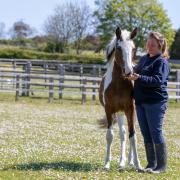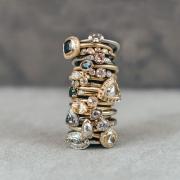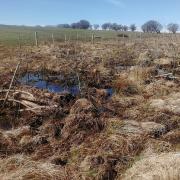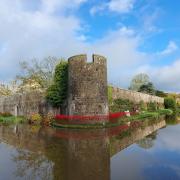M-24 founder Mat Dusting tells Hannah Rowe about his unusual products and why they are still produced in Somerset

M-24 has become renowned for its unique bags made from lorry curtains destined for landfill. Each one is unique and you have to be quick to buy one - when the latest supply of bags appears online, it runs out very quickly.
The business began in 2012, when founder Mat Dusting wanted a bag for university which wouldn’t be damaged by his files. A Product Design student, his first attempts were trial and error when the basic sewing machine he purchased from Bredons in Taunton wouldn’t sew through the tough tarpaulin. Undeterred, he bought a walking foot machine (which is used to sew leather) from a gentleman living in the Blackdown Hills, but had no idea how to use it.
Fast forward a month and he decided to concentrate on the design rather than the manufacture and found a small company near Bridgwater that repaired horse-riding saddles. Mat would deliver the pre-cut pieces of tarpaulin to them to be sewn - and M-24 was born.
Funded by his own money and a grant from The Princes Trust, which he obtained after attending an Enterprise Programme in Weston-super-Mare, Mat quickly grew his stock and later the same year took 50 bags to the National Ski Show in London. He sold out.

Seven years later M-24 bags are beloved across the world, with 40 per cent of sales coming from overseas in places like mainland Europe, Australia, and Japan. That is partly down to Mat’s very clear marketing strategy, which he explains: “Our bags are put online as a ‘drop’, with customers knowing when this will be by way of the countdown clock on the website. The ‘drop’ idea was a test to begin with as we didn’t know how effective it would be, but every time we do one it sells out really quickly so we have stayed with it.”
Another promotional strategy which has proved effective is the use of ‘M-bassadors’ who promote the company through their own channels. Again, this is something on which Mat has a very clear strategy. He explains, “From the very early days of M-24 people have been asking us if we would like their help to promote the brand, but at the time we couldn’t afford to pay anyone. We’re very careful about who we will collaborate with, only working with people who care as passionately about the environment as we do. We’re wary of using ‘influencers’, as millennial shoppers are savvy and would see through it.”
So who is a typical M-24 customer? It’s something which Mat has spent a great deal of time researching and, although I won’t reveal all his trade secrets, this was partly done by talking to customers at M-24’s pop-up shops and finding out about their lives. This insight has given him a clear idea of an M-24 bag aficionado, whom he describes as ‘male or female, under 25, cycles to their work as a graphic designer in Shoreditch. They’re interested in design and are attracted to the bags both because of their environmental credentials and their aesthetic value – no two are the same, and they often feature part of a graphic or a telephone number’.
M-24 may now be known worldwide, but Mat is proud to say that its roots and production are still very much a Somerset concern. The bags are made locally and photographed by Mat every few weeks at his family’s farm near Taunton, where his first ill-fated attempts at sewing took place.
Looking to the future, Mat has a clear environmental aim. A member of the Road Haulage Association, he is currently recycling approximately 10 per cent of its annual lorry curtain wastage but wants to recycle 100 per cent so that none will go to landfill.
M-24 continues to grow, and is branching out into a new product line later this year. The new line is currently a secret, but one thing’s for sure – it is certain to become a must-have item for those graphic designers from Shoreditch.
5 STEPS TO MAKING A BAG FROM A LORRY CURTAIN
Firstly you need the material, which is salvaged from transport companies across the UK. Then, the tarpaulins are cut into giant rolls so that they are easier to manage. All the smaller components are recycled, and the webbing is retained to become the handles on the bags. The next stage is cleaning, which is done in industrial-sized washing machines. The clean tarpaulin is then cut and sewn into the finished bags.
The final stage is to photograph the bags at Mat’s family farm, before they are packed and taken to the M-24 warehouse ready to become the next ‘drop’.
Somerlap Forest Products, based in Mark, has 12 lorries in its fleet, each with burgundy lorry curtains featuring a white and green design. The company has been supplying M-24 with its old lorry curtains for several years, as it fits well with its own environmentally-friendly ethos, which includes chipping pallets which cannot be repaired for fuel in heating kilns, such as the one at its premises.



























